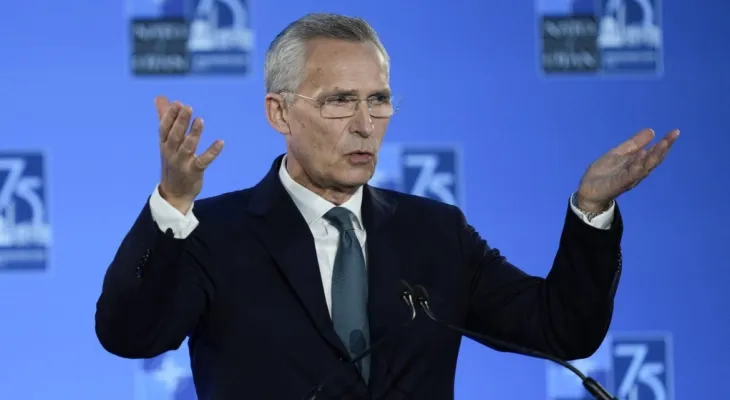Search here
Newspaper
Search here

Arab Canada News
News

Published: July 11, 2024
- In their most severe rebuke to Beijing, NATO members on Wednesday described China as a "crucial enabler" of Russia's war against Ukraine and expressed concerns about Beijing's nuclear arsenal and space capabilities.
The strongly worded final statement, approved by the 32 NATO member countries at their summit in Washington, clarifies that China has become a focal point for the military alliance. European and North American members, along with partners in the Indo-Pacific region, increasingly see common security concerns emerging from Russia and its Asian backers, particularly China.
Beijing insists it is not providing direct military assistance to Russia, but has maintained strong trade relations with its northern neighbor throughout the conflict.
In the statement, NATO member states said that China has become an enabling tool for the war through its "unlimited partnership" with Russia and its extensive support for the Russian defense industrial base.
This exacerbates the threat posed by Russia to its neighbors and to Euro-Atlantic security. We call on the People's Republic of China, as a permanent member of the United Nations Security Council, to bear a special responsibility to support the purposes and principles of the UN Charter, to cease all material and political support for the Russian war effort.
The document states: "The People's Republic of China cannot allow the largest war in Europe in modern history to occur without negatively affecting its interests and reputation."
NATO Secretary-General Jens Stoltenberg said that China provides the equipment, precision electronics, and tools that "enable Russia to build missiles, manufacture bombs, build aircraft, and produce weapons used to attack Ukraine."
This is the first time all NATO members have clearly stated this in an agreed-upon document.
In response, China's embassy in Washington stated on Wednesday that China is not the maker of the Ukrainian crisis nor a party to it. Liu Pengyu, spokesperson for the embassy, added: "China does not supply weapons to the parties in the conflict and imposes strict controls on the export of dual-use materials, which is widely appreciated by the international community."
He said that China's normal trade with Russia "is conducted openly" and "without suspicion."
Danny Russell, former Assistant Secretary of State for Asian Affairs, described NATO's new wording as "extraordinary," particularly since it was accompanied by a warning that Beijing continues to pose "systemic challenges" to European interests and security.
Russell, who is now the Vice President for International Security and Diplomacy at the Asia Society Policy Institute, said: “It is a sign of how unsuccessful Beijing has been in trying to interpose between Russia and Western Europe and how its claims of neutrality are hollow.” "China's attempts at divide-and-conquer have instead produced remarkable solidarity among key states in the Euro-Atlantic and Indo-Pacific regions."
Max Bergmann, director of the Europe and Russia Program at the Center for Strategic and International Studies, said the statement is "extremely important" as it signals to China that Europe, just like the United States, also condemns support for Russia.
Bergmann said: "The United States believes that Europe has leverage over Beijing, and that while China will not pay much attention to U.S. condemnation, it will care about European condemnation because simply put, while Europe trades with China, China also trades with Europe."
In this year's final declaration, NATO member states reaffirmed their concerns over China posing "systemic challenges" to Euro-Atlantic security. This was raised for the first time in 2021.
The alliance stated that China was behind malicious and ongoing cyber and hybrid activities, including disinformation, and expressed concerns over China's space capabilities and activities. It also raised concerns that China is rapidly expanding and diversifying its nuclear arsenal with more warheads and an increased number of advanced delivery systems.
Liu, spokesperson for the Chinese embassy, stated that China addresses such issues "in a responsible manner with transparent policies."
Liu pointed out that "exaggerating the so-called 'Chinese threat' is completely futile," adding that Beijing strongly opposes NATO's use of hot regional issues to smear China and provoke a new Cold War.
In Washington, where NATO leaders are gathering this week to celebrate the 75th anniversary of the alliance, President Joe Biden stated that the alliance must not fall behind Russia, which is ramping up weapons production with the assistance of China, North Korea, and Iran.
Australia, New Zealand, Japan, and South Korea sent their leaders or deputies to the NATO summit in Washington this week. They are partners, not members of the alliance.
In the final declaration, NATO members emphasized the importance of partners in the Indo-Pacific region to the alliance, stating that they "enhance dialogue to address regional challenges."
NATO and partners in the Indo-Pacific region plan to launch four projects to support Ukraine, enhance cooperation in cyber defense, combat disinformation, and work in artificial intelligence. NATO members stated that these projects "will enhance our ability to work together to achieve common security interests."
Comments